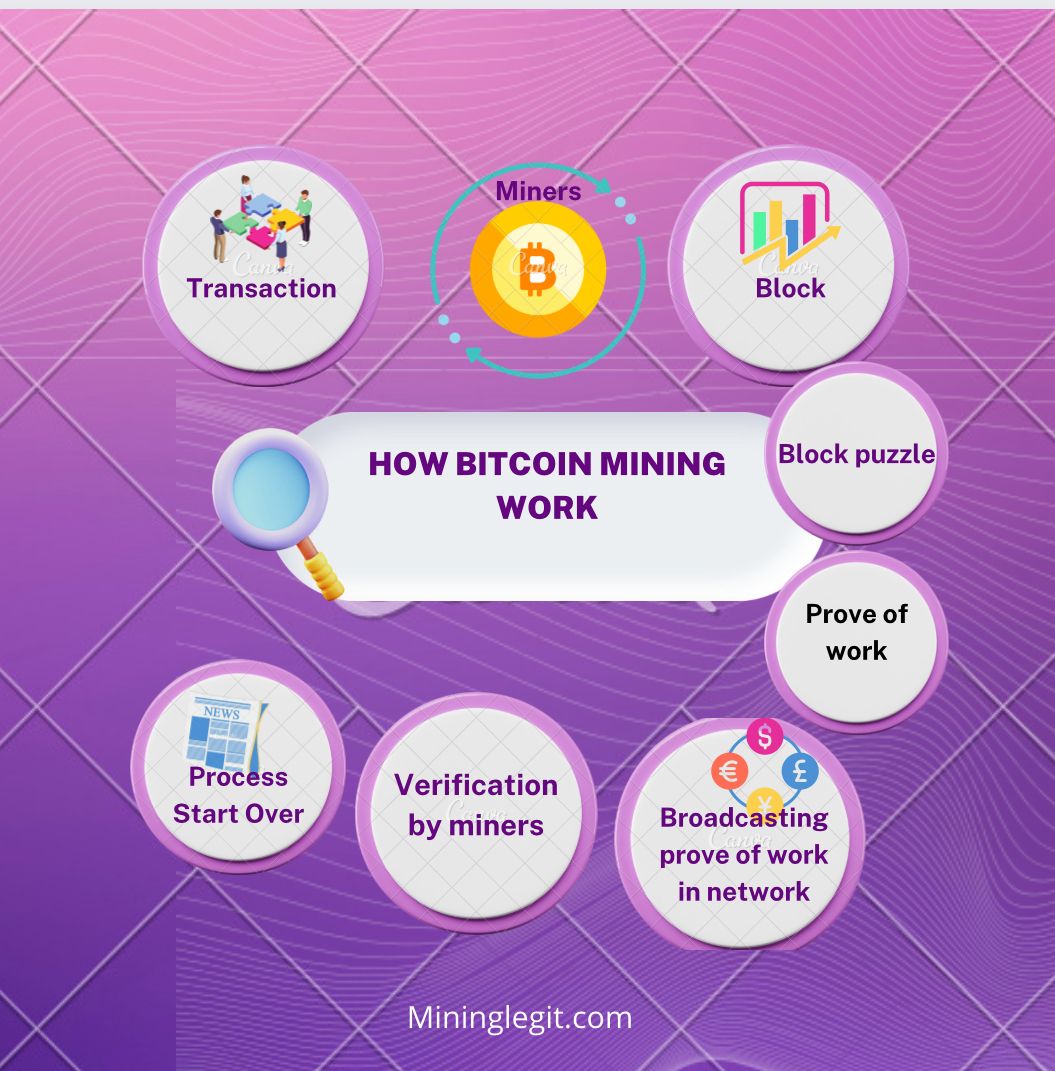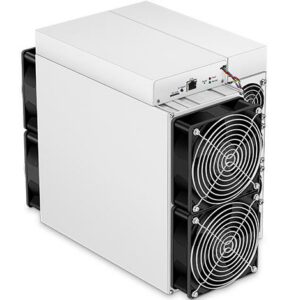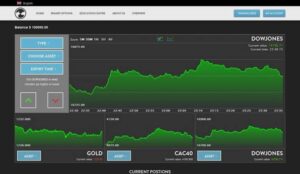
Bitcoin mining is a fundamental process that underpins the entire Bitcoin network. As the world’s first decentralized digital currency, Bitcoin relies on a decentralized network of computers, known as miners, to validate transactions and secure the blockchain.
In this article, we will delve into the intricacies of Bitcoin mining, exploring how it works, the role of miners in the network, the challenges and opportunities they face, and the technological advancements that shape the future of this industry. Whether you are a curious observer or an aspiring miner, this comprehensive guide will provide valuable insights into the fascinating world of Bitcoin mining.
Introduction to Bitcoin Mining
Start mining with reliable platform
What is Bitcoin?
Bitcoin is the digital currency that has taken the world by storm. It’s like regular money, but instead of physical coins or bills, it exists only in the online realm. However the price of bitcoin is not stable and No central authority regulates it, which means no sneaky banks or governments have control over your hard-earned cash. Bitcoin miners can earn through cloud mining as far as they can pay the electricity cost.
An Overview of Bitcoin Mining
Alright, now let’s talk about Bitcoin mining. No, we’re not talking about coal miners with hard hats and pickaxes. Bitcoin mining is the process by which new Bitcoins are brought into existence and transactions are verified. Miners use powerful computers to solve complex mathematical problems and add new blocks to the blockchain, the magical ledger that keeps track of all Bitcoin transactions.
How Does Bitcoin Mining Work?

The Blockchain and Mining Process
Picture the blockchain as a never-ending scroll that records every single Bitcoin transaction ever made. Miners play a crucial role in this process by verifying and adding new transactions to the blockchain. It’s like being the bouncer at the coolest party in town, only instead of checking IDs, you’re ensuring transactions are legit.
Proof-of-Work Concept
To make sure no one can easily manipulate the blockchain, Bitcoin introduced the concept of “proof-of-work.” Miners compete against each other to solve complex mathematical puzzles, with the first one to solve it getting the chance to add a new block and earn some shiny new Bitcoins. It’s like a high-stakes Sudoku championship, but with digital money at stake.
Transaction Verification and Block Creation
Once a miner solves the puzzle, they broadcast their solution to the network, and all other miners check if it’s correct. If the solution checks out, a new block is created, containing a bunch of verified transactions.
This block is then added to the blockchain, and the miner who solved the puzzle is rewarded with newly minted Bitcoins. It’s like finding a pot of gold at the end of a mathematical rainbow. Adding bitcoin blockchain explorer for easy transaction verification
The Role of Miners in the Bitcoin Network
Securing the Bitcoin Network
Miners play a crucial role in keeping the Bitcoin network secure. Their computational power makes it incredibly difficult for any bad actors to manipulate the blockchain or cheat the system. However, It’s like having a bunch of tech-savvy bodyguards protecting your precious digital assets.
Verifying Transactions and Preventing Double Spending
By verifying transactions before they’re added to the blockchain, miners prevent the dreaded double spending problem. They make sure that you can’t use the same Bitcoin to buy a fancy coffee and an exquisite piece of art at the same time. Thanks, miners, for saving us from awkward situations and angry artists.
Consensus Mechanisms and Mining Pools
Since mining can be a competitive game, some miners join forces in what are called mining pools. It’s like forming a superhero team to fight the evil forces of complexity and uncertainty. By pooling their resources and computing power, these miners increase their chances of solving the puzzles and earning those glorious Bitcoins.
Challenges and Opportunities in Bitcoin Mining
Increasing Difficulty and Competition
As more people jump into the mining game, the puzzles get tougher, making it harder to solve them and earn those sweet rewards. It’s like the Olympics of math, where everyone wants a gold medal, but only a few can actually snatch it. So, prepare yourself for some serious competition and brain-busting puzzles.
Energy Consumption and Cost Considerations
Bitcoin mining is a power-hungry endeavor. All that complex math and high-speed computing require a significant amount of energy. So, miners need to consider the cost of electricity, cooling systems, and the potential impact on the environment. Mining Bitcoins isn’t just a game of numbers; it’s also a game of watts.
Regulatory and Legal Challenges
Since Bitcoin operates outside of the traditional financial system, governments and regulators are scratching their heads about how to deal with it. For now, there are no federal laws explicitly prohibiting Bitcoin mining in the United States.. There’s a bit of a Wild West vibe going on as different countries figure out their stance on cryptocurrencies.
So, miners need to keep an eye on ever-changing regulations and avoid potential legal pitfalls. No need to end up in a courtroom drama, right? Now that you have a grasp on Bitcoin mining, put on your digital hard hat, fire up those computers, and dive into the exciting world of mining. Happy hashing, my friend!
Mining Hardware and Software: A Comprehensive Overview

Types of Mining Hardware
When it comes to Bitcoin mining, having the right hardware is crucial. There are various types of mining hardware available, each with its own strengths and weaknesses. For starters, there are CPUs (Central Processing Units), GPUs (Graphics Processing Units), and ASICs (Application-Specific Integrated Circuits).
CPUs, while capable of mining, are not as efficient as GPUs or ASICs. GPUs, commonly found in gaming computers, offer a balance between efficiency and cost-effectiveness. ASICs, on the other hand, are specifically designed for mining Bitcoin and are currently the most popular option due to their unmatched processing power. Some can work with specific integrated circuit asic
Mining Software and Configuration
To mine Bitcoin, you need specialized mining software that connects your hardware to the Bitcoin network. Popular options include ecos, binance, and NiceHash, which provide user-friendly interfaces and offer features like monitoring, controlling, and optimizing your mining operations.
After installing the software, you’ll need to configure it to connect to a mining pool or solo mine. Mining pools allow miners to combine their computing power and share rewards, while solo mining involves mining alone without a pool. Configuration involves setting up your wallet address, pool information, and optimizing mining parameters for efficiency and profitability.
Pros and Cons of Different Mining Equipment
Each type of mining hardware has its own advantages and disadvantages. CPUs are readily available and can be used for other tasks when not mining, but they are inefficient and generate low hashing power. GPUs offer better efficiency and higher hashing power, but they consume more electricity and can be expensive.
ASICs, despite being expensive, provide the highest hashing power and energy efficiency. However, they can quickly become obsolete as technology advances, requiring frequent hardware upgrades. It’s important to consider factors like initial cost, electricity consumption, and potential future upgrades when choosing your mining equipment.
The Economics of Bitcoin Mining
Mining Rewards and Block Subsidy
Bitcoin mining is not just about solving complex mathematical problems; it’s also about earning rewards. Miners are rewarded with newly minted Bitcoins and transaction fees for each block they successfully mine. The block subsidy, which started at 50 Bitcoins, halves roughly every four years, reducing the number of new coins created.
Transaction Fees and Revenue Generation on Bitcoin Mining
Transaction fees play a significant role in the revenue generated by miners. As the number of Bitcoins generated per block decreases over time, transaction fees become more important. Miners prioritize transactions with higher fees, incentivizing users to pay more for faster confirmation. The revenue from transaction fees can make up a significant portion of a miner’s earnings.
Cost Analysis and Return on Investment
Mining Bitcoin requires investment in hardware, electricity, and maintenance costs. It’s important to factor in these expenses when analyzing the profitability of mining. Additionally, with the increasing competition and difficulty, mining returns may fluctuate. Individual Miners need to assess their costs against their potential earnings to determine their return on investment (ROI).
Environmental and Energy Implications of Bitcoin Mining
Energy Consumption and Carbon Footprint
Bitcoin mining requires a substantial amount of energy, leading to concerns about its environmental impact. bitcoin reward might be less compare to its cost. The energy consumption of the entire Bitcoin network is comparable to that of some countries. This reliance on fossil fuels contributes to the carbon footprint associated with Bitcoin mining.
Renewable Energy Solutions for Mining
To address the environmental concerns, there has been a growing interest in utilizing renewable energy sources for Bitcoin mining. Some mining operations are being powered by solar, wind, or hydroelectric energy, reducing their carbon footprint. As renewable energy becomes more accessible and cost-effective, it could help mitigate the environmental implications of mining.
Environmental Concerns and Sustainability
Besides energy consumption, Bitcoin mining also raises concerns about e-waste generated by discarded mining hardware. Sustainable mining practices involve recycling or repurposing outdated hardware to minimize the environmental impact for crypto miners. Additionally, promoting transparency and responsible mining practices within the industry is crucial for long-term sustainability.
The Future of Bitcoin Mining: Trends and Innovations

1 Shift from Proof-of-Work to Proof-of-Stake
One significant trend in the future of Bitcoin mining is a potential shift from the energy-intensive Proof-of-Work (PoW) consensus algorithm to the more energy-efficient Proof-of-Stake (PoS). PoS relies on validators who hold and lock their crypto currency to secure the network, reducing the need for power-hungry mining equipment.
2 Advancements in Mining Hardware and Efficiency
As technology progresses, mining hardware continues to evolve. Manufacturers are constantly developing more efficient and powerful ASICs, allowing miners to achieve higher hash rates while consuming less energy. These advancements can lead to increased profitability and a reduced environmental impact.
3 Exploration of Alternative Mining Methods
Researchers and innovators are exploring alternative mining methods beyond traditional hardware-based mining. Concepts like cloud mining, where users rent computing power remotely, and decentralized mining protocols are being developed to make mining more accessible and distributed. These alternative methods could play a significant role in the future of Bitcoin mining.In conclusion, Bitcoin mining plays a crucial role in the operation and security of the Bitcoin network.
It is a complex process that requires specialized hardware, software, and significant energy consumption. As the crypto currency ecosystem evolves, the future of Bitcoin mining holds both challenges and opportunities.
While the mining landscape continues to evolve, with advancements in technology and the exploration of alternative methods, the fundamental principles of securing transactions and maintaining the integrity of the blockchain remain at the core of this industry. Whether you are interested in the technical aspects, economic considerations, or environmental implications, Bitcoin mining is a captivating field that continues to shape the world of digital currencies.
FAQ
1. What is Bitcoin mining and why is it important?
Bitcoin mining is the process by which new Bitcoins are created and transactions are verified and added to the blockchain. It is important because it ensures the security, integrity, and decentralization of the Bitcoin network. Miners play a crucial role in validating transactions and preventing double-spending.
2. How do miners earn rewards from Bitcoin mining?
Miners earn rewards in two ways: through block rewards and transaction fees. When a miner successfully solves a complex mathematical problem and adds a new block to the blockchain, they receive a predetermined amount of newly minted Bitcoins as a block reward. Additionally, miners may earn transaction fees for including transactions in the blocks they mine.
3. Is Bitcoin mining profitable?
The profitability of Bitcoin mining depends on various factors such as the cost of electricity, mining hardware efficiency, and the current Bitcoin price. While mining can be profitable, it is a highly competitive and resource-intensive process. It is essential to carefully consider the upfront investment, ongoing expenses, and market conditions before getting involved in Bitcoin mining. For more information contact us.
4. Can I mine Bitcoin with any computer?
In the early days of Bitcoin, it was possible to mine using regular computer processors. However, as mining difficulty increased, specialized hardware known as ASICs (Application-Specific Integrated Circuits) became necessary to mine profitably.
Nowadays, mining Bitcoin with standard consumer-grade computers is not feasible. Specialized mining rigs with high computational power are required for efficient mining. However graphics processing units gpus and high amount of computing power is needed to carry out a good block of transactions. Learn more about mininglegit Start invinvesting in bitcoin.





